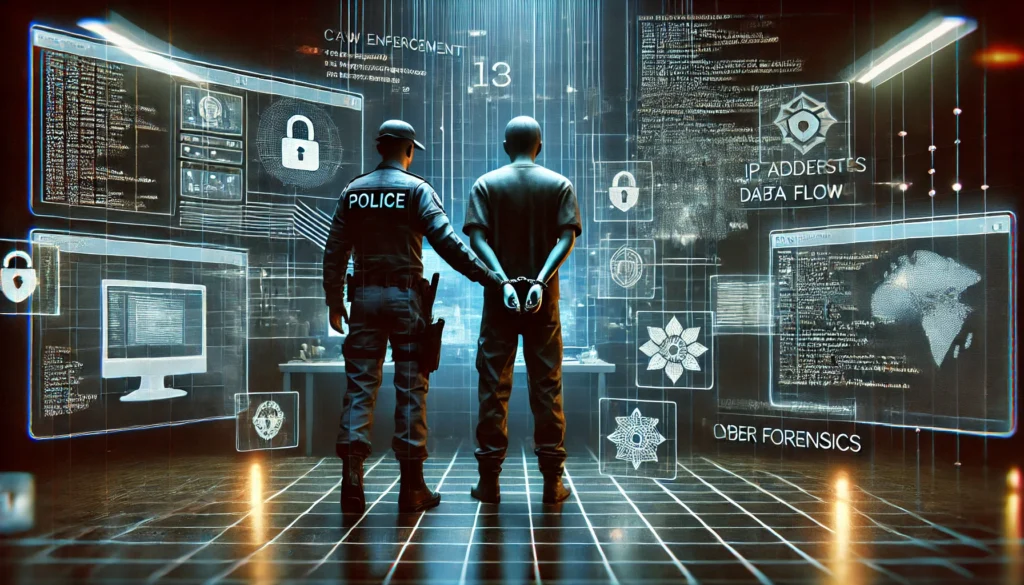In today’s world, our lives are more connected to the internet than ever before. We shop online, manage bank accounts, communicate on social media, and even work remotely. But as we live more of our lives online, there’s also a dark side – cybercrime. And when cybercrime gets serious, law enforcement steps in, often leading to what’s called a “cyber arrest.”
But what exactly is a cyber arrest? Let’s break it down.
What is a Cyber Arrest?
A cyber arrest happens when law enforcement catches someone for committing crimes online. Cybercrime can take many forms: stealing personal information, hacking, online fraud, cyberbullying, and spreading viruses or malware are just a few examples. For anyone involved in these activities, a cyber arrest could mean facing serious legal consequences.
Types of Cybercrimes that Lead to Arrest
Here are some common cybercrimes that can lead to a cyber arrest:
- Hacking: Gaining unauthorized access to systems, like breaking into someone’s email or a company’s database, to steal or alter information.
- Identity Theft: Using someone else’s personal information – like credit card numbers or social security numbers – to commit fraud.
- Online Fraud: This includes scams where attackers trick people into giving away their money, like fake shopping sites or phishing emails pretending to be from a bank.
- Cyberstalking and Cyberbullying: Harassing or bullying someone through online platforms like social media.
- Ransomware and Malware Attacks: Sending malicious software to lock people’s files and demanding payment to unlock them.
- Exploitation and Abuse of Minors: This involves distributing illegal content online that exploits minors, which law enforcement agencies worldwide are highly committed to stopping.
How Do Cyber Investigations Work?
Cyber investigations are complex, and officers use many digital tools to track down criminals. Here’s what typically happens in a cyber investigation:
- Digital Forensics: Experts look for evidence on computers, phones, and other digital devices. This could include emails, browsing histories, or social media posts.
- IP Address and Device Tracking: By tracking IP addresses (unique numbers assigned to each internet-connected device), investigators can often locate where illegal activity is happening.
- Social Media Monitoring: Officers watch social media for suspicious activities, like posts that suggest illegal activities or fraud.
- Communication Surveillance: In some cases, with legal permission, law enforcement can monitor emails or messages if they suspect illegal behavior.
- Global Coordination: Cybercrimes don’t follow borders – an attack might start in one country and target people in another. So, agencies like Interpol and Europol help law enforcement work together worldwide.
Legal Side of Cyber Arrests
Cybercrime investigations have to follow strict rules to protect people’s privacy and rights. Here are a few examples:
- Warrants and Permissions: Police often need a legal warrant to search someone’s devices or monitor their online activity.
- Digital Privacy Laws: Different countries have laws about privacy that must be respected, like the GDPR in Europe, which protects users’ personal data.
- Cybercrime Laws: Many countries have specific laws on cybercrimes, which outline what counts as an offense and the penalties involved. For example, the United States has the Computer Fraud and Abuse Act (CFAA), and India has the Information Technology Act.
Challenges in Catching Cybercriminals
Tracking down cybercriminals isn’t easy. Here are some of the challenges law enforcement faces:
- Anonymity and Encryption: Many criminals hide their identities using VPNs, encryption, or by operating on the dark web, which makes them harder to trace.
- Jurisdiction Issues: Since the internet is global, cybercrime often involves suspects or victims in different countries. Local laws might not apply, so authorities need international cooperation.
- Evidence Integrity: Digital evidence can be altered, so law enforcement must follow strict guidelines to keep evidence safe and authentic for court cases.
Real-Life Examples of Cyber Arrests
There have been several major cyber arrests in recent years that highlight the power and reach of cyber investigations:
- Operation Phish Phry: This operation involved cooperation between U.S. and Egyptian authorities, leading to the arrest of over 100 people involved in a phishing scheme targeting bank customers.
- Silk Road Takedown: The FBI shut down Silk Road, an infamous dark web marketplace for illegal goods, and arrested its founder. This was a massive operation showing the reach of cyber law enforcement.
- Ransomware Gang Arrests: International police forces, including Interpol, have been arresting members of ransomware gangs that targeted businesses and demanded millions in ransom to unlock files.
Consequences of a Cyber Arrest
People arrested for cybercrimes face serious legal consequences, which may include:
- Fines and Penalties: Cybercriminals can be ordered to pay large fines.
- Prison Sentences: Serious offenses, especially those involving theft or harm to individuals, can lead to lengthy jail time.
- Seizure of Assets: Authorities can seize money or property earned through cybercrimes.
The penalties depend on the severity of the crime and the local laws, but even minor cyber offenses can have long-term consequences for those arrested.
Looking Ahead: The Future of Cyber Arrests
As technology advances, so does law enforcement’s ability to tackle cybercrime. Tools like artificial intelligence and machine learning are becoming more common, allowing officers to detect and prevent cybercrimes faster and more accurately. Additionally, governments worldwide are working together more closely, creating policies and frameworks to handle cyber threats across borders.
Cyber arrests are a critical part of keeping the online world safe, but they also remind us all of the importance of cybersecurity. For individuals and businesses, staying aware of cyber threats and protecting personal information is the first line of defense.
In a world where so much of life happens online, cyber arrests are becoming increasingly important to protect our digital spaces. As these crimes continue to evolve, so will the efforts to stop them, creating a safer internet for everyone.



